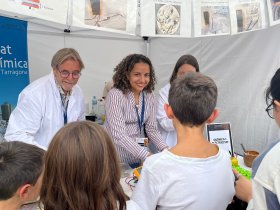Génesis María Guarimata Salinas


PhD Programme: Economics and Business
Research group: FHOM – Factor Humá, Organitzacions i Mercats
Supervisors: Joan Josep Carvajal Martí, Maria del Mar Reguero de la Poza & Mireia Valverde Aparicio
Bio
Génesis Guarimata Salinas, is a Systems Engineering graduate (2013) from the Universidad de Oriente (UDO) in Venezuela, her native country. Between 2013 and 2018 she had the opportunity to work in Venezuela and Ecuador, holding different positions in educational and technological management. With her work experience and motivation to learn and generate knowledge; she decided to study the master's in Business Management (2019-2020) at the Universitat Rovira i Virgili, taking the research specialization and developing activities as a BIDI fellow. She developed her TFM, as an exploratory research, which aimed to evaluate the phenomenon of the management of an intangible asset, such as knowledge, focusing mainly on the variables of assimilation, acquisition, transformation and exploitation of knowledge to improve organizational learning forms. She obtained her degree in 2020.
Project: Impact of PhD supervisory training: measurement and improvement
The recent and widespread growth in interest in pursuing PhD studies has led to a striking increase in candidates for doctoral programs, many of whom present widely varying profiles. Consequently, a general recognition has emerged that supervising a PhD is not a given. Rather, it is a role replete with responsibilities and the highest academic standards and expectations that requires much training and preparation of supervisors. As a result of these new needs, universities have responded with a broad range of approaches based on varying degrees of involvement and effort directed towards PhD training provision. In this context, it is now time to take stock of the outcomes of such efforts, in macro terms, by profiling the range of practices and approaches at the European level, and in micro terms, by reviewing the impact of specific approaches to providing PhD supervision training.
This research project attempts to analyze the impact of PhD supervision training on the roles and activities undertaken by supervisors and the quality of the supervision received by PhD candidates. To do so, the project will identify and consider different approaches to the measurement of this impact. This will be with a view to generating improvements in institutional approaches to providing PhD supervision training and their corresponding follow up activities.
Outreach activities
- European Researchers' Night 2022: "Tots podem contribuir a la ciència".
- European Researchers' Night 2023: "Empresar-te : Empresa, art i creació".



